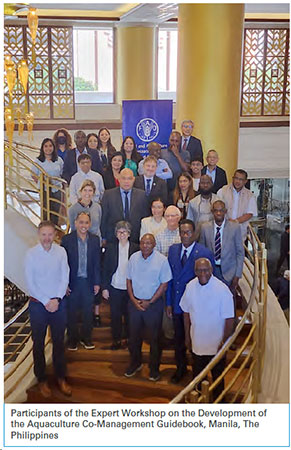Co-management in aquaculture: A collective effort towards sustainability

The concept of co-management as an effective and collaborative approach to managing fisheries resources has been widely recognized and accepted. In the context of aquaculture, its application is evolving and adapting to meet the challenges of the sector’s expansion and the need for sustainable resource management in the face of challenges such as population growth, climate change, and resource overexploitation.
The journey towards incorporating co-management in aquaculture has taken significant strides since FAO’s initial Expert Workshop on Aquaculture Co-management in Kigali, Rwanda in June 2022. The outcomes of that workshop laid the foundation for a three-year project, “Development of the Aquaculture Co-management System for Sustainable Aquaculture”, funded by the Korea Maritime Institute of the Republic of Korea.
This project was launched in 2023 with the goal of producing essential knowledge products and developing a framework for applying co-management in aquaculture. The project aimed to align aquaculture practices with relevant aspects of the 2030 Agenda for Sustainable Development and the Blue Transformation Roadmap. These include: enhancing cooperation, planning, and governance for aquaculture development and management; fostering equitable access to resources and services for aquaculture-based livelihoods; and ensuring regular monitoring and reporting of the ecological, social, and economic impacts of aquaculture development.
The knowledge products produced under this initiative will include both a comprehensive guidebook and an e learning course, designed to facilitate the establishment of diverse types of aquaculture co-management systems, complemented by case studies. These case studies, spanning various aquaculture collaborative production systems, aim to provide valuable insights into the adaptability and effectiveness of co-management principles in diverse contexts.
 In October 2023, FAO convened an Expert Workshop on the Development of the Aquaculture Co-management Guidebook in Manila, the Philippines. The event marked a pivotal moment in the ongoing efforts to expand co-management principles to the aquaculture sector, with experts and practitioners from around the world converging to advance sustainable aquaculture practices. This workshop brought together approximately 34 experts with diverse knowledge and expertise in aquaculture spanning various areas, including fisheries and aquaculture co-management, small-scale aquaculture, aquaculture economics, governance and planning, aquaculture extension, ecosystem-based approaches, and climate change.
In October 2023, FAO convened an Expert Workshop on the Development of the Aquaculture Co-management Guidebook in Manila, the Philippines. The event marked a pivotal moment in the ongoing efforts to expand co-management principles to the aquaculture sector, with experts and practitioners from around the world converging to advance sustainable aquaculture practices. This workshop brought together approximately 34 experts with diverse knowledge and expertise in aquaculture spanning various areas, including fisheries and aquaculture co-management, small-scale aquaculture, aquaculture economics, governance and planning, aquaculture extension, ecosystem-based approaches, and climate change.
Lionel Dabbadie, FAO Representative in the Philippines, welcomed the participants and emphasized the vast potential benefits of co-management in aquaculture, ranging from improved resource management to enhanced social capital and knowledge-sharing. The workshop was opened by Drusila Esther E. Bayate, Undersecretary for Fisheries of the Department of Agriculture in the Philippines who emphasized the pivotal role of aquaculture in the Philippines, citing its remarkable growth as a result of substantial government investments in research and development.
With input from experts across multiple disciplines, the objectives of the workshop were to enhance understanding of aquaculture co-management, identify key case studies, and finalize the background document for developing aquaculture co-management systems, serving as the foundation for the forthcoming guidebook.
The definition of aquaculture co-management (ACM), as developed at an Expert Workshop in Kigali, Rwanda in 2022, states: Aquaculture Co-Management is a set of strategic and operational collaborative approaches that enable decision-making between public agencies, producers, civil society, supporting services, and other stakeholders along the value chain. These actors share responsibility, rights, and benefits over how, where, and when the management of shared resources and risks are practiced (FAO, 2023).
This definition was generally accepted by workshop participants. Suggestions were made to incorporate wording on social equity, emphasizing the shared but differentiated responsibilities of stakeholders and collaborators in engaging with co-management. It was argued that this addition would align the definition more closely with FAO’s Blue Transformation. The revised definition will be included in the Guidebook. The overall framework for implementing ACM was derived from the Guidebook for evaluating fisheries co-management effectiveness (Pomeroy et al., 2022). Participants agreed with the structure and scope of ACM implementation steps.
The Expert Workshop in Manila was a significant milestone in the finalization of the aquaculture co-management guidebook. The forthcoming guidebook will offer guidance on various types of aquaculture co-management, strategic and operational goals, and best practices, as well as guidance for implementation, monitoring, and evaluation. FAO’s commitment to the 2030 Agenda for Sustainable Development, as evidenced by the Expert Workshop and the three-year project, has emphasized the importance of transforming aquaculture into a sustainable sector.
Source: FAO. 2024. FAO Aquaculture News. July 2024, No. 68. Rome

